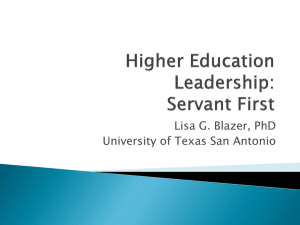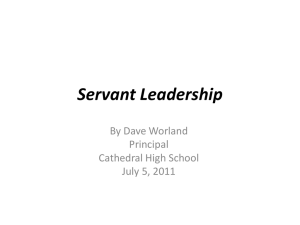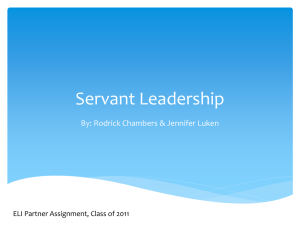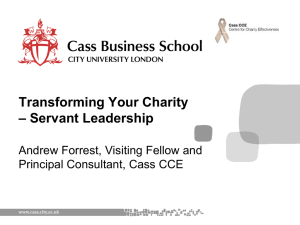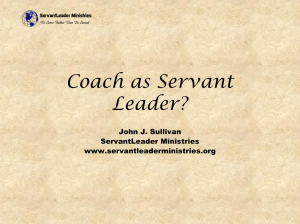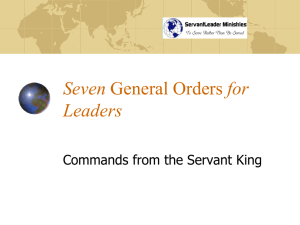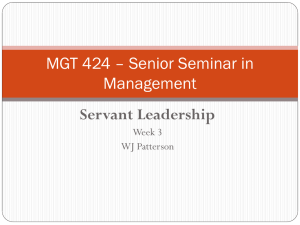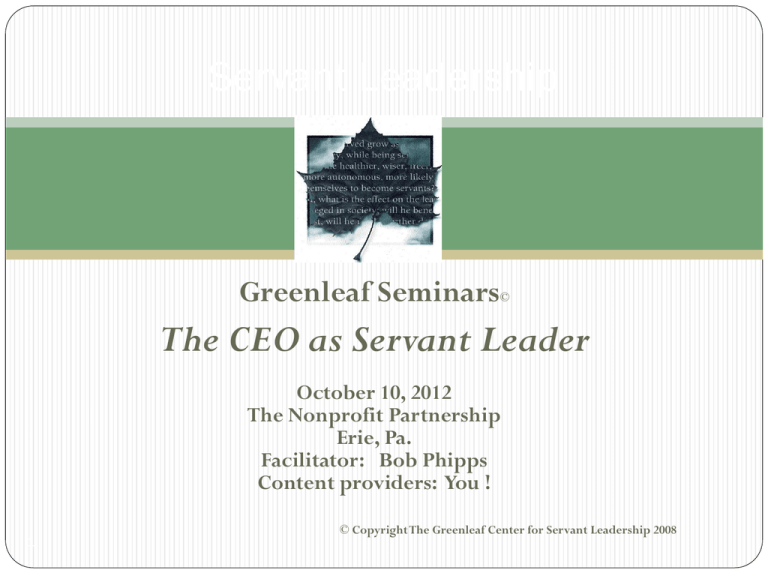
Servant Leadership
Greenleaf Seminars
©
The CEO as Servant Leader
October 10, 2012
The Nonprofit Partnership
Erie, Pa.
Facilitator: Bob Phipps
Content providers: You !
1
© Copyright The Greenleaf Center for Servant Leadership 2008
Introductions
This is not a corrective seminar….rather it builds on things you may
2
have experienced as a leader or follower over the years !
Normal length is 3.5 hours/ we are limited today to 1 hour and 15
minutes, so it will be an introduction .
Materials come from similar seminars done for many
companies/agencies/organizations under the auspices of The
Greenleaf Center for Servant Leadership.
Questions and Answers About Servant Leadership by Kent Keith is
our primary text with references to other materials found in the
leadership field.
I am working on the concepts as well, and have been for a long time
(i.e. connecting concepts to my own actions).
Some expectations (of each other)
for our time together
Listen care-fully
Option to pass
Speak for yourself
Expect unfinished business
Recognize the variety of opinion
dimension in the room !
Take responsibility for your own
learning !
Note what is of meaning to
you….power point can be e-mailed
if you so desire.
Agenda
-To
share with participants the background and
history of the servant leader approach.
-To help participants understand the contrast
between the power model of leadership and the
servant model of leadership.
-To assist participants in “personalizing” their
approach to leadership and apply servant leader
principles to their own lives.
-To introduce the seven key practices of a servant
leader and help individuals incorporate these
practices into their own leadership style.
4
But first …
Draw a time line of your life from the
early teen years until now…..
-Names (positions) of those who “mentored
you” or who you would characterize as
individuals who served you
-Characteristics of those persons….what were
they like. What were things they did/didn’t
do. Things they said/didn’t say !
5
The desire to serve
Servant leadership begins with the desire to
serve
Universal recognition of the importance of
serving others can be found in many religions
Serving others is not just something we do–
it ought to be the way in which we do our work !
Power Based
Service Based
ME
US
Leader
Serving
First
First
Purdue University is an Equal Opportunity/Equal
Access instiution.
DIFFERENCES
Power Base Leadership
Service Base Leadership
Making people do things
Help people do things
Hierarchy
Anybody can serve
Grabbing
Giving
Power is a goal
Power is a tool
Focus on personal credit
Focus on the goal
Create dependency
Empower
Patriarchy
Partnership
Purdue University is an Equal Opportunity/Equal
Access institution.
The Servant-Leader
The servant-leader is servant first.
It begins with the natural feeling that one
wants to serve, to serve first.
Then conscious choice brings one to aspire to
lead
That person is sharply different from one who
is leader first.
The leader-first and the servant-first are two
extreme types.
ROBERT K. GREENLEAF, THE SERVANT AS LEADER © 1991, 2008
9
Seven Key Practices
(a review of the way in which a servant
leader “lives”)
Self-Awareness
Listening
Dealing with the pyramid
Developing your colleagues
Coaching, not controlling
Unleashing the energy and intelligence of
others
7. Foresight
1.
2.
3.
4.
5.
6.
10
Self-Awareness
One’s own strengths and weaknesses.
Emotional intelligence.
The impact of one’s words and deeds.
It’s not just what we do (enhance the lives of those we touch by
empowering them to reach their goals),
it’s how we do it !
Reflection.
Humbleness.
Being comfortable with myself which invites…trust, open
feedback, willingness to give up control.
“We recognize the importance of accurate information. We practice open,
truthful, and timely communication with veterans, employees, and external
stakeholders. By carefully listening and responding to their concerns, we
seek continuous improvement in our programs and services.”
11
Listening
Key to understanding how to identify
the needs of others
Servant leaders don’t begin with the
answer- but with questions.
Indian talking stick used by Covey
when facilitating the World Leadership
Forum among Christians, Jews, and
Muslims.
12
Thinking about servant
leadership…
(focus person)
How would those you work with
describe your leadership style.
What is a leadership trait you are
working at strengthening ?
What causes a person that desires
to be a servant leader to migrate to
the power model of leadership ?
How do you safeguard against this ?
How can you be consistent and fair
as a servant leader while upholding
the business expectations of the
organization ?
Dealing with the pyramid
Structure in itself is not bad…we all need
some structure !
In the traditional pyramid, the workforce is
focused on the boss, not the customer.
Blanchard: Servant leader articulates vision,
then inverts the pyramid to help colleagues
implement.
A pyramid is lonely at the top: abnormal and
corrupting for the leader.
15
The Alternative:
Flatten the pyramid—have a team at
the top!
Everyone serves down, across and up
You can influence within your “own” pyramid.
16
Developing Your Colleagues
Greenleaf’s business ethic: the work exists
for the person as much as the person
exists for the work.
Kendal Corporation starts before
employment -hiring the right staff !
Volunteers may be seeking a new talent or
gift they have not been able to develop
elsewhere.
Four levels of learning.
17
Four Levels of Learning
Unconscious
Competence
Conscious
Competence
Conscious
Incompetence
Unconscious
Incompetence
Coaching, not Controlling
The traditional focus on “control”.
Servant leaders coach and mentor.
James Autry: list of six things he
believes about leadership.
Developing others focuses on the
potential leaders needs and desires.
19
Unleashing the energy and intelligence of
others
Creating an environment where people are
encouraged to use their energy and intelligence.
People become empowered when you provide
them with three things: opportunity, freedom and
security.
People are the biggest asset most organizations
have, so not using that asset is wasteful.
20
Foresight
Greenleaf said foresight is the central ethic of leadership, the
21
“lead” that the leader has.
Not predicting specific events, but the underlying trends, issues,
patterns that help identify a future direction.
A good “chess player” looks five moves ahead…. foresight.
A good hockey player skates to where the puck is going to be….
foresight.
It takes a leader with vision to see the future leader within the
person (John Maxwell).
Arie de Geus: example of forecasting when the rivers will swell
and flood the valleys.
A& P vs Kroger.
Three stories of servant leadership:
YMOT (Tom Stenavin)
Robert Rogers (lose
yourself in service to
others)
Six jars of peanut
butter….
What to call it…
The seven key practices can be
called:
Serving leadership
Service-oriented leadership
Needs-based leadership
Level 5 leadership (Collins)
Co-Leadership (Heenan & Bennis)
23
Robert K. Greenleaf
The servant-leader is servant first … then conscious
choice brings one to aspire to lead.
The best test (of servant leadership) is:
Do those served grow as persons? Do they, while being served,
become healthier, wiser, freer, more autonomous, more likely
themselves to become servants?
And what is the effect on the least privileged in society?
Will they benefit or at least not be further deprived?
24
The Paradoxical Commandments
People are illogical, unreasonable, and self-centered
LOVE THEM ANYWAY
If you do good, people will accuse you of selfish ulterior motives
DO GOOD ANYWAY
If you are successful, you will win false friends and true enemies
SUCCEED ANYWAY
The good you do today will be forgotten tomorrow
DO GOOD ANYWAY
Honesty and frankness make you vulnerable
BE HONEST AND FRANK ANYWAY
The biggest men and women with the biggest ideas can be shot
down by the smallest men and women with the smallest minds
THINK BIG ANYWAY
25
The Paradoxical Commandments
People favor underdogs but follow only top dogs
FIGHT FOR A FEW UNDERDOGS ANYWAY
What you spend years building may be destroyed overnight
BUILD ANYWAY
People really need help but may attack you if you do help them
HELP PEOPLE ANYWAY
Give the world the best you have and you’ll get kicked in the teeth
GIVE THE WORLD THE BEST YOU HAVE ANYWAY
© Copyright Kent M. Keith 1968, 2001 all rights reserved
www.paradoxicalcommandments.com
26
The Paradoxical Commandments
Even when the world is going badly, we can
still find personal meaning and deep
happiness
As individuals, we can’t control external
factors, but we can keep in mind the words
of Viktor Frankl:
“Everything can be taken from a man but….the last
of the human freedoms-to choose one’s attitude in
any given set of circumstances, to choose one’s
own way”
Viktor E. Frankl in Man’s Search for Meaning
27
Summary
Servant leadership is ethical, practical, and
meaningful.
Serving others is not just something you do. It’s
what life is about.
Be a servant leader and make your organization a
success.
Be a servant leader and look back on a life filled
with meaning.
28
So what….how could these two
hours make a difference ?
Identify one leadership trait you would like to work at
strengthening.
Develop your strategy as to how you are going to strengthen that
trait.
Find a “trusted” accountability partner that you can share your
plan with and who can give you regular feedback on how you are
doing.
29
Thank you!
30



